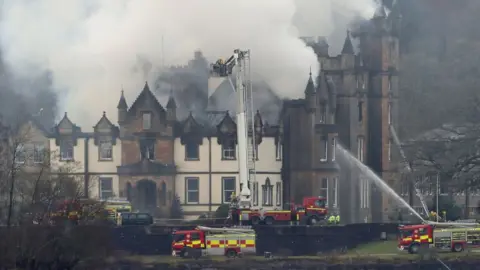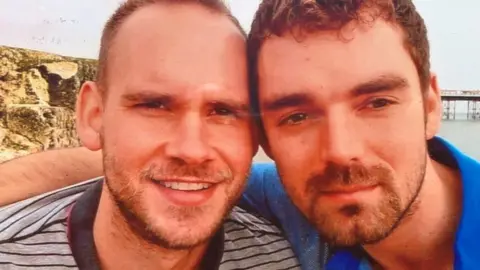Cameron House: Final day of evidence over fatal fire
 PA Media
PA MediaA fatal accident inquiry into a fatal fire at Cameron House hotel has finished hearing evidence.
The December 2017 fire at the Loch Lomond hotel claimed the lives of Simon Midgley, 32, and Richard Dyson, 38 - a couple from London who were on holiday.
An architect told the inquiry mandatory fire suppression or sprinkler systems should be considered when historic buildings were converted into hotels.
The sheriff's determination will be published in due course.
The fire broke out after night porter Christopher O'Malley left a plastic bag of ash in a concierge's cupboard containing newspapers and kindling.
Cameron House was later ordered to pay £500,000 after it admitted to breaches of fire safety rules, while O'Malley admitted breaching the Health and Safety at Work Act and was given a community payback order.
Architect Peter Drummond was tasked with writing a report on the fire and looking at any lessons for the future.
He told the 11th day of the inquiry that, in his view, when historic buildings were converted into hotels in the future, making the installation of fire suppression or sprinkler systems mandatory should be considered.

The inquiry at Paisley Sheriff Court was held to determine if lessons could be learned to minimise the risk of future deaths.
On Friday, the court heard how management at Cameron House did not hold fire drills at night prior to the fatal blaze. It usually held them in the mornings or afternoons.
The inquiry was also previously told about the hotel's fire plan which, under its general section, stated: "Combustible material of any kind must not be stored in general electrical or boiler rooms."
The Crown Office initially said an FAI was not needed because the circumstances of the fatalities had been established - but a review overturned the decision after Simon Midgley's mother Jane called for wider lessons to be learned.
She has attended the inquiry every day.
A coroner in England ruled that the couple were unlawfully killed and raised concerns that he had not been allowed access to documents and CCTV footage by Scottish authorities.
